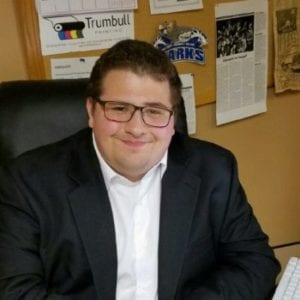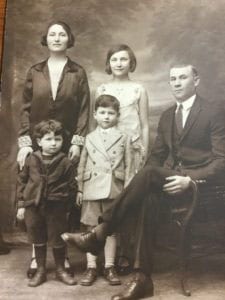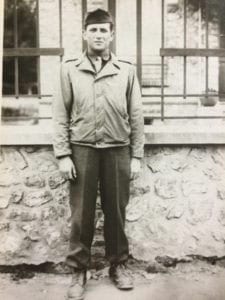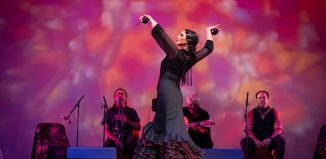Open Mike: Auschwitz or America – History has its eyes on you
By Michael Tessler

My great-grandfather Louis arrived at Ellis Island at the onset of the Great War. He grew up in the predominantly Jewish community of Sighet. This small region of Hungary (now Romania) had been occupied and reoccupied by many countries throughout the 20th century. Sighet, however, remained largely the same. Its tight Jewish community maintained its traditions, history and, most importantly, faith.
Louis’ family sent him away in fear he would be drafted into the brewing conflict. So with what money he had, he traveled 1,000 miles from Hungary to the bustling port of Hamburg in Germany. One can only imagine how dangerous that trip must have been — navigating Europe as it began to rip at the seams. He survived though and boarded a ship destined for the promised land of America.
Like so many before him he arrived in New York City. Even as I write this, I smile at the thought of his first gaze upon the Statue of Liberty. At the time, just another face among the huddled masses … to me, the very reason I exist.
Assimilation wasn’t easy. He ended up marrying a woman from the same village and they started a family together. Their child Sam was a tremendous source of brightness in an otherwise unforgiving city.

Louis’ family kept him going. He worked long and painful hours for a fur company in Manhattan. Before unions, before labor laws and before regulations — he inhaled dangerous chemicals daily as he dyed the fur, leaving him with chronic health problems.
His American Dream devolved quickly though as his home was consumed by a fire and with it his wife and only child. One can only imagine his dread. Thousands upon thousands of miles away from his only remaining family, he committed himself to rebuilding his life, and by extension, creating mine.
Louis remarried and had two children with my great-grandmother — my grandpa, Melvin Tessler and his brother Max. They grew up on Riverside Drive, both lovers of the city’s growing jazz scene.
Through an unfortunate reality, my great-grandfather wasn’t wanted in this country. Many anti-Semites peddled Jewish conspiracies, believing them to be an enormous danger to American society. When my grandfather was a little boy, Louis took him to work at the fur factory so his son could see what he did. His boss, however, hated the Jews and made a point of humiliating my great-grandfather in front of his son. He never took him to the factory again.
Though Louis was sent to America to be saved from joining a global conflict, it was a painful irony that both his sons were drafted into the army and became American soldiers in World War II.

My grandfather Mel served proudly in Europe, where he developed trench foot, almost losing his feet to rot. Around his neck he wore the Star of David, his dog tags and a pillbox containing cyanide tablets in the event he was captured by the Nazis, knowing full well he’d be tortured for information if they knew of his Jewish ancestry. His brother Max served in North Africa where he contracted a malaria type disease. These young boys, the sons of refugee immigrants, served a nation that just a generation prior had not welcomed their father.
My Grandpa Mel would go on to become the head of the English Department at Port Jefferson High School and married my Grandma Sally, a teacher at Scraggy Hill Elementary. No doubt some of my readers had them as teachers.
In his class, he’d have the students read the book “Night” by Elie Wiesel, a celebrated Holocaust survivor who dedicated his life to serving humanity. Several years ago I had the great fortune of being invited to the United Nations, where I heard Mr. Wiesel speak. In the halls of the General Assembly his voice echoed “never again.” It was more than just a phrase but a perpetual call to action, one that we are all responsible to heed. I’ve taken that to heart.
What I did not know at the time was that Elie Wiesel and I shared something in common. He too was from Sighet, my ancestral home. In 1944, the Third Reich occupied Hungary and decimated its Jewish population, first by forcing them into ghettos and then eventually to the concentration camp of Auschwitz. Whatever family remained perished there during the Final Solution.
Whether by gas chamber in Auschwitz or by sniper fire in Aleppo … murder is still murder and is equal in the eyes of God. No man is greater than the other just because of their faith or any more deserving of our compassion. No civilized society, especially one built on the principles of “life, liberty, and the pursuit of happiness” can remain ignorant of the world at large. To do so undermines not just our nation’s values but the essence of our humanity itself.
We cannot forget that our complacency, and more precisely, our fear, allowed countless innocents to die as waves of Jewish refugees were turned away from the United States. We must show bravery like those who risked their lives to hide Jewish families in their basements. If we are so scared that we are unable to help, then we have already lost, for without humanity we are nothing.
Had America not welcomed in my great-grandfather all those years ago, he too would be in the huddled masses lying dead outside Auschwitz. Do not forget, history has its eyes on you.







